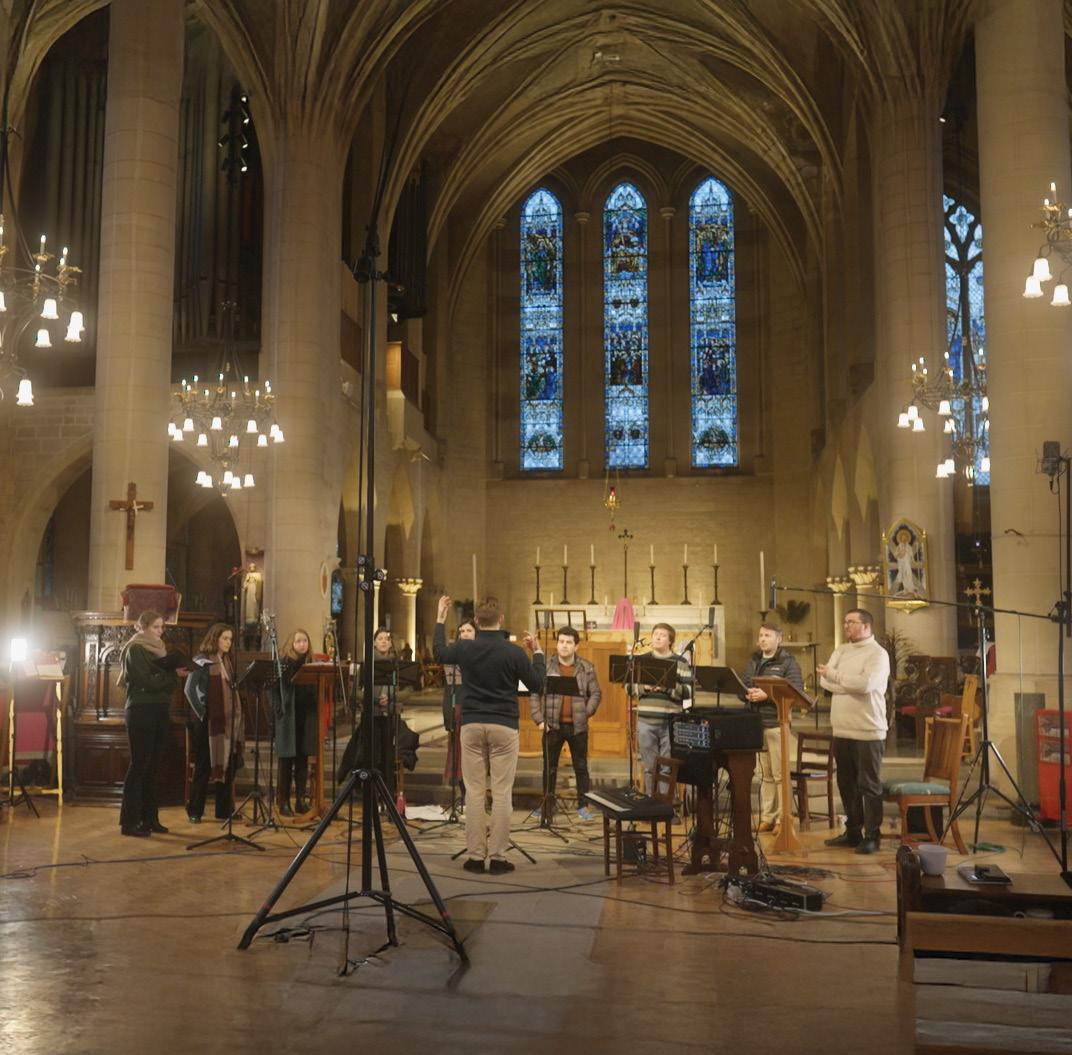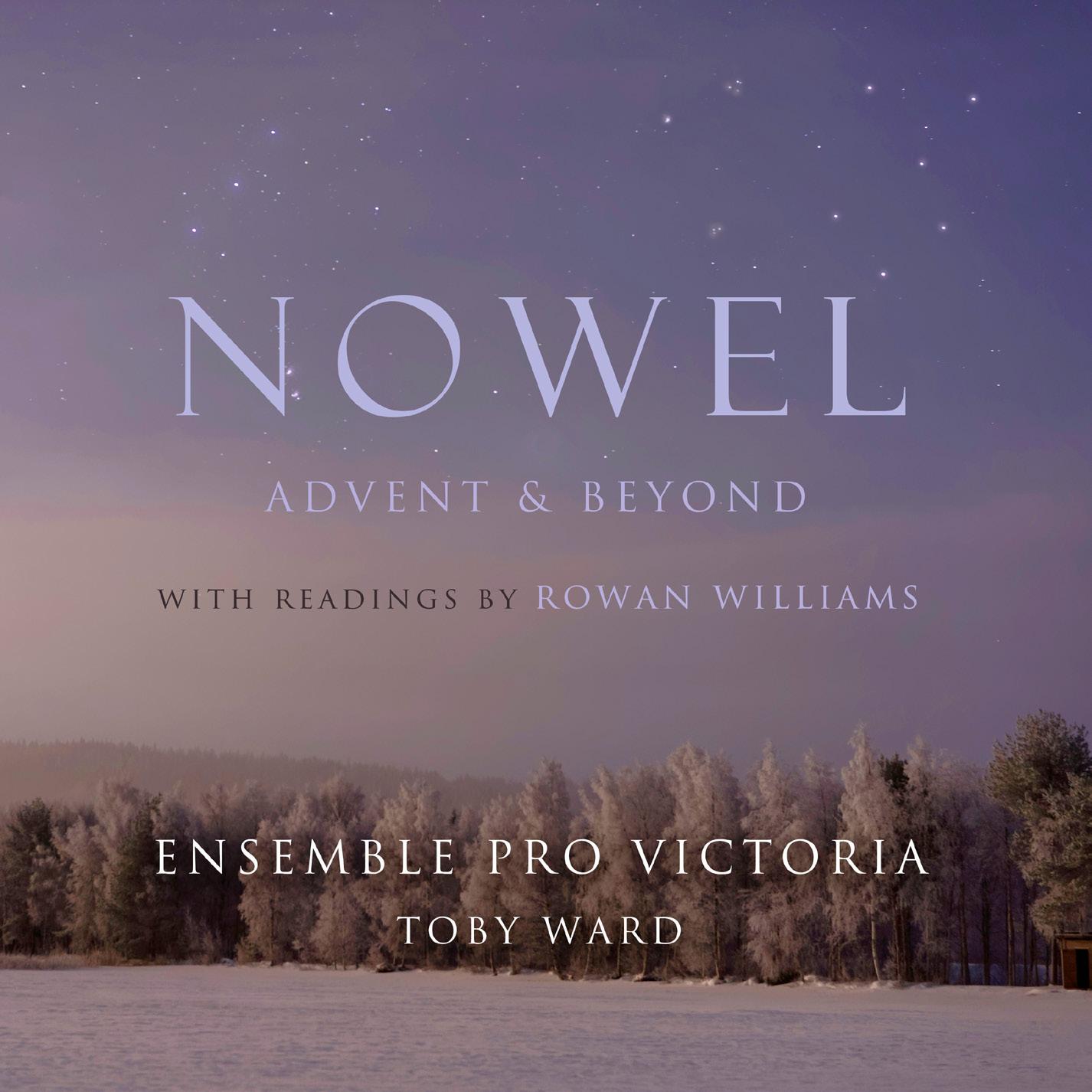

NOWEL
ADVENT
& BEYOND
readings by Rowan Williams
Pro Victoria | Toby Ward 1 Piers Connor Kennedy (b. 1991) Advent Calendar *
Hannah Ely, Fiona Fraser, Áine Smith soprano
Matthew Farrell, David McGregor, Elisabeth Paul, Anna Semple alto
David de Winter, Nicholas Madden, James Micklethwaite, James Robinson, Simon Wall tenor
Gavin Cranmer-Moralee, Humphrey Thompson baritone | Piers Connor Kennedy, Stuart O’Hara bass
Cecily Beer harp 18–27 | Matthew Farrell bass viol 1, 33 | Anthony Gray chamber organ 1, 33
A babe is borne of hye natewre [2:00]
Philip W.J. Stopford (b. 1977) Lully, Lulla, Lullay [4:24]
Michael Praetorius (1571–1621) Es ist ein Ros entsprungen [4:45] and Melchior Vulpius (1570–1615)
For Christians, the spiritual journey through Advent to Christmas expands the everyday tension of a promise made but as yet unfulfilled. Our contemporary Christmases tend not to be expectations but certainties; part of the allure of Advent music lies in its recreation of the uncertainty of expectation and its emphasis on emotional preparation. In looking beyond what we know, we can focus on the spiritual promise that comes as part of the deal. In acknowledging reality, we can incubate our own sense of quiet joy and ensure any gifts eventually received, emotional or physical, are well deserved.
In Christian traditions, Advent is the beginning of time – the start of a ritual cycle of birth, life, death and salvation reenacted year after year. In the context of Christian liturgical worship these cycles are communicative and communal: the theatrical manufacturing of space and time, journeyed through together, experienced as periods of reflection on joy, fear, loss and, in this case, anticipation. Not for nothing was the symbolic light of Christmas placed in the depths of the European winter, as a seasonal counterbalance to the feasting of Midsummer.
Like all traditions, that of Advent has been shifted, prodded, manipulated and inventedupon by human hands with agendas both noble and cynical. This album from Ensemble Pro Victoria channels traditions ancient and more modern, straddling the centuries, the
North Sea and the music and poetry of the vernacular and the refined.
The idea of alternating Advent-themed readings and music in a service not prescribed by the prayer books of the English church originated in Cornwall in 1880, where the construction of a new cathedral in Truro (and the compulsory repossession and demolition of houses to make way for it) had succeeded in creating reservoirs of ill-will between the townsfolk and the new diocese. It was the charismatic first Bishop of Truro, Edmund White Benson (later Archbishop of Canterbury), a man with a flair for evangelism and an active social conscience, who developed a Christmas Eve service of Nine Lessons and Carols – partly to get his flock back on side.
In 1918, Eric Milner White adapted Benson’s idea for use in the chapel at King’s College, Cambridge but he stuck to Benson’s beautifully simple principle: a ladder of readings plotting the narrative of Christmas and reflecting on its meaning, recounted by a hierarchy of readers from junior choirboy to bishop, each followed by a musical setting that reinforced the words just heard.
We hear another adaption on this recording: a bishop, yes – Benson’s sometime successor in Canterbury, Rowan Williams, who cocurated the recording and reads those traditional narrative lessons (the album also
opens with a setting of one of his poems). But around these readings are woven the Seven Chorale Variations from Die Weihnachtsgeschichte (‘The Christmas Story’) by Hugo Distler.
Distler led a short, troubled life before committing suicide in 1942 at the age of 34, unwilling to stomach the ongoing carnage of the Second World War. He had been raised by his grandparents in Leipzig, attending St Thomas’s School and the Leipzig Conservatory, but was forced to cut his studies short due to lack of funds, at which point he was employed as Organist at the St Jacobi Kirche in Lübeck (a post once held by Dietrich Buxtehude) where he enjoyed the most stable, fruitful and contented period of his life. Distler left Lübeck for Stuttgart in 1937, moving later to Berlin where his professional and personal existence under Nazi rule became impossibly fraught. When the composer returned to Lübeck in 1942 and was faced with the sight of the city’s wholesale destruction, his spirit was broken.
Distler described Die Weihnachtsgeschichte as ‘an oratorio with the character of chamber music’. It dates from 1931, his first year in Lübeck, and was structurally inspired by Heinrich Schütz’s St Matthew Passion, which was performed at the St Jacobi Kirche every Good Friday. Around the Christmas narrative (taken from the gospels of Luke and Matthew), Distler wove seven variations on the chorale
Es ist ein Ros entsprungen, a Marian hymn text from Germany that draws on the Book of Isaiah to prophesy the coming of Jesus and emphasise the significance of his lineage. Distler’s resourcefulness and discipline as a composer is clear in his treatment of the chorale tune in a language refracted from that of the German baroque. More significant even than his cut-glass polyphony and harmonic decoration is his multidirectional probing of the meaning of the hymn’s words, freeing them from the potentially obscuring effects of the very traditions they underpin.
Even for the deeply spiritual, any sense of Advent expectation is coloured by the time and context in which it’s felt. Distler, more than composers in our own newly precarious times, seems to have experienced a sense of hope lined with concern, darkness even. Something of that sentiment tints Advent Calendar, a setting of Rowan Williams’s poem of the same name by Piers Connor Kennedy.
Kennedy is a Welsh–Irish composer and musician who has spent time between the choirstalls of Llandaff Cathedral, Worcester Cathedral, Christ Church Cathedral, Oxford and the chapels of St Peter’s College, Oxford and St John’s College, Cambridge. Despite protesting that he is ‘not a singer, but merely someone who sings a bit’, he recently became a member of The King’s Singers. As a composer, Kennedy has been shaped by the
aesthetics of pop, rock, folk and computer game music and by the English church music tradition of the twentieth century in particular; he has commented on the ‘bittersweet beauty’ inherent in the music of Britten, Warlock and Leighton.
delivered in Advent services by a disembodied voice or voices, in the dark or out of view).
windblown weightlessness, even though the music remains almost entirety homophonic.
Kennedy’s proximity to Ensemble Pro Victoria and Toby Ward has helped him write them music bespoke; one of his priorities as a composer is to tailor works to a particular ensemble’s musical personality or sound style. Advent Calendar, commissioned by the 2021 Harrogate Advent Festival, is a piece for choir, viol and unobtrusive organ that is shot through with a deep sense of expectation. The choir’s music creeps inside Williams’s verse and its allusions to the physical violence of birth, as the instruments provide a Bruegel-like contextual landscape; the soft shroud’s folding.
Kennedy’s Nowel el el was commissioned by Ensemble Pro Victoria and the harpist Cecily Beer in 2023 and conceived as a partner piece to Britten’s A Ceremony of Carols from 1942, also scored for voices and harp (though unlike Britten, Kennedy writes for adult male voices). The work is bookended by Kennedy’s own arrangement of two of the ‘O Antiphons’ or ‘Great Advent Antiphons’ – vespers antiphons for Advent originating in sixth-century Italy, in which a single vocal line beckons the divine down to earth with a ritualistic solemnity and a feeling of pleading (these antiphons are often
In between the antiphons come ten settings of mostly anonymous medieval texts and in some cases their associated tunes, which often carry the strong rhythmic profile associated with carolling. After the invocation of ‘That lovely lady sat and song’, whose music spools out like a spinning wheel, the syncopations of ‘Owt of your slepe aryse and wake’ have a sharpening effect (the influence of Britten’s harmonic language is clear here). The reflective repose of ‘This flour is fayre and fresche of heue’ leads to the cautious but burgeoning expectation of ‘Puer nobis natus est’ before the perpetual motion of ‘Nowel el el’. ‘O sisters’ incorporates what we know as the Coventry Carol, whose dark sentiments introduce stress and strain to the cycle and temporarily silence the harp.
‘Of a rose, a lovely rose’ picks up the text of the chorale used by Distler. Here the music’s thickening textures appear to feed the barely contained excitement of ‘When Cryst was born of Mary fre’ with its geometric harmonic gameplay. There is intense anticipatory mystery in ‘This rose is reed of colour bryght’, dispelled by the breaking of Advent’s tension in ‘A babe is borne of hye natewre’.
Herbert Howells’s A Spotless Rose, setting an English version of Est ist ein Ros entsprungen, trades the rooted certainty of the German chorale tune for a certain
The composer wrote it off-the-cuff in 1919 as he watched train carriages being shunted from a window, a detail that can be difficult to reconcile with the music’s poised, understated inhabiting of the sentiments of the words.
O Oriens by David McGregor was first performed by Ensemble Pro Victoria and Toby Ward, who commissioned it, at the Harrogate Advent Festival in 2022. It sets the fifth of the ‘O Antiphons’, describing the ‘splendour of eternal light’ which will enlighten those to sit in darkness. Richly scored for five-part choir, it opens hesitantly with alto voices rocking sinuously on adjacent notes, before mustering luminous intensity as other voices join in, the rocking riff becoming a pining theme.
Lulla, Lullaby is found in William Byrd’s 1588 collection Psalms, Sonnets and Songs of Sadness and Pietie. Byrd’s polyphonic music manages to distill the text, which refers to the Virgin comforting her baby at the time of the slaughter of the innocents, while drawing something exceptionally moving from it –notably in the effect of the second voice part incessantly tracking the first, as if to offer it comfort. We know a version of this text and tune as the Coventry Carol (and heard it as part of Kennedy’s sequence), in which form it was reworked in 2008 by Philip Stopford, whose Lully, Lulla, Lullay emphasises the rocking of the cradle song and the voice of the mother,
rendered by a soprano soloist. In this version, the ordinary baby is doomed to die; this is a cradle song for eternal sleep.
The harmonised version of Es ist ein Ros entsprungen that we know best, and from which Distler sprang his own chorale variations, is that made in 1609 by the German composer Michael Praetorius: a standardised but deeply satisfying rendering with telling harmonic touches, particularly in its penultimate line.
To end the album, with the feeling not so much of coming ‘full circle’ as acknowledging the eternal, cyclic way of things, we hear Praetorius’s harmonisation followed by a round on the tune by his contemporary Melchior Vulpius. Here, voice parts lay identical versions of the melody over one another, staggering their entries by the distance of three bars to create a default polyphonic weave: a cycle of guarded joy and anticipation that, technically, doesn’t have to end at all.
© 2025 Andrew Mellor
Andrew Mellor is author of the award-winning
The Northern Silence: Journeys in Nordic Music and Culture and the forthcoming What We Talk About When We Talk About Opera
and translations
1 Advent Calendar
He will come like last leaf’s fall. One night when the November wind has flayed the trees to the bone, and earth wakes choking on the mould, the soft shroud’s folding. He will come like dark. One evening when the bursting red December sun draws up the sheet and penny-masks its eye to yield the star-snowed fields of sky. He will come, will come, will come like crying in the night, like blood, like breaking, as the earth writhes to toss him free. He will come like child.
Rowan Williams (b. 1950)
Seven Chorale Variations from Die Weihnachtsgeschichte
3 I. Es ist ein Ros entsprungen
Aus einer Wurzel zart, Als uns die Alten sungen, Von Jesse kam die Art Und hat ein Blümlein bracht Mitten im kalten Winter, Wohl zu der halben Nacht.
There is a rose sprung up from a tender root, as the ancients have told us in song, its lineage came from Jesse. And it has brought forth a little flower in the midst of cold winter, in the depths of night.
5 II. Das Röslein, das ich meine, Davon Jesaias sagt,
Ist Maria die reine, Die uns das Blümlein bracht. Aus Gottes ew’gem Rat
Hat sie ein Kind geboren
Und blieb ein reine Magd.
This little rosebush of mine of which Isaiah sang, is Mary the pure, who brought the flower to us. In God’s eternal plan she bore a child and remained a spotless virgin.
7 III. Meine Seele erhebt/Wir bitten dich Meine Seele erhebt den Herrn, und mein Geist freuet sich Gottes, meines Heilands; denn er hat die Niedrigkeit seiner Magd angesehen. Siehe, von nun an werden mich preisen alle Kindeskind; denn er hat große Dinge an mir getan, der da mächtig ist und des Name heilig ist. Seine Barmherzigkeit währet immer für und für bei denen, die ihn fürchten.
Luke 1: 47–50 (Lutherbibel, 1912, slightly adapted)
My soul doth magnify the Lord, and my spirit hath rejoiced in God my Saviour. For he hath regarded the low estate of his handmaiden: for, behold, from henceforth all generations shall call me blessed. For he that is mighty hath done to me great things; and holy is his name. And his mercy is on them that fear him from generation to generation.
Wir bitten dich von Herzen, Du edle Königin, Durch deines Sohnes Schmerzen, Wann wir fahren dahin Aus diesem Jammertal: Du wollest uns begleiten Bis in der Engel Saal!
We pray you from our hearts, noble Queen, by your son’s passion, that when we go hence from this vale of tears, you will escort us into the hall of the angels!
9 IV. Das Blümelein, so kleine, Das duftet uns so süß, mit seinem hellen Scheine Vertreibt’s die Finsternis: Wahr Mensch und wahrer Gott, Hilft uns aus allem Leide, Rettet von Sünd und Tod. Eia!
The little flower so small that has such sweet fragrance for us, drives away the darkness with its bright light: true man and true God, he rescues us from all sorrows, saves us from sin and death. Eia!
11 V. Die Hirten zu der Stunden Machten sich auf die Fahrt; Das Kindlein bald sie funden Mit seiner Mutter zart.
Die Engel sangen schon, Sie lobten Gott, den Herren In seinem höchsten Thron.
The shepherds started out straightaway on their journey; the little child they soon found with his tender mother. Already the angels were singing, praising God the Lord on his highest throne.
13 VI. Lob, Ehr sei Gott, dem Vater, Dem Sohn und Heil’gen Geist. Maria, Gottes Mutter, Dein Hilf an uns beweis
Und bitt dein liebes Kind, Daß es uns woll behüten, Verzeihen unser Sünd.
Praise and glory to God the Father, the Son and the Holy Spirit. Mary, God’s mother, show us your assistance and pray your dear child to protect us well and forgive us our sins.
15 VII. So singen wir all Amen, Das heißt: nun wird es wahr, Was wir begehr’n allsammen.
O Jesu, hilf uns dar
In deines Vaters Reich, Drin wollen wir dich loben.
O Gott, uns das verleih!
German, before 1599
So sing we all Amen, that is: may what we all desire now come true. Jesus, help us across to your Father’s kingdom: there we wish to praise you. O God, grant us this!
Translation: Delphian Records
Nowel el el
17/28 I. Procession: O Emmanuel
O Emmanuel, rex et legifer noster, exspectatio gentium, et Salvator earum: veni ad salvandum nos Domine Deus noster.
Antiphon at vespers for 23 December
O Emmanuel, our king and lawgiver, the longedfor of the nations and their saviour: come to save us, our Lord God.
18 II. That lovely lady sat and song
Thys endris nyght
I saw a sight
A stare as bryght as day, And ever among A mayden song, ‘Lullay, by-by, lullay.’
That lovely lady sat and song, And to hyr chyld con say, ‘My sone, my broder, my fader der, Why lyest thou thus in haye?
My sweet bryd, Thus it ys betyde, Thow thou be kyng veray; But nevertheles
I wyll not ses
To syng “by-by, lullay”.’ Thys endris nyght …
‘My der moder, whan tym it be, Thou take me up on loft,
And set me ryght upon thi kne, And handyll me full soft, And in thi arme
Thou hyl me warme, And kepe me nyght and day; If I wepe
And may not slepe, Than syng “by-by, lullay”.’
Thys endris nyght …
Thys endrys nyght – the other night; whan tym it be
– when the time comes; take me up on loft – pick me up; hyl me warme – cover me up warmly 19 III. Owt of your slepe aryse and wake Nowel, nowel, nowel, Nowel, nowel, nowel!
Owt of your slepe aryse and wake, For God mankind nowe hath y-take
Al of a maide without eny make; Of al women she bereth the belle. Nowel!
And throwe a maidë faire and wys
Now man is made of ful grete pris; Now angeles knelen to mannes servys, And at this tyme al this byfel. Nowel!
That ever was thralle, now ys he fre; That ever was smalle, now grete is she; Now shal God deme bothe the and me Unto his blysse yf we do wel. Nowel!
Now, blessëd brother, graunte us grace
A domësday to se thy face
And in thy courte to have a place, That we mow there synge the nowel. Nowel!
without eny make – without a man/matchless; bereth the belle – takes the prize; pris – worth; thralle –enslaved; deme – assign; A – at; mow – may
20 IV. This flour is fayre and fresche of heue
There is a floure sprung of a tre, The rote therof is called Jessé, A floure of pryce; Ther is non seche in paradise.
This flour is fayre and fresche of heue; Hit fades never bot ever is new; The blisful branche this flour on grew Was Mary myld, that bare Jhesu, A flour of grace; Ayayns al sorrow hit it is solas.
I pray youe, flours of this cuntré, Whereevere ye go, wereever ye be, Hold up the flour of good Jessé Fore your frescheness and youre beuté, As fairest of al, And ever was and ever schal.
There is a floure …
John Audelay (fl. 1417–?1432)
pryce – excellence; ayayns – against
21 V. Puer nobis natus est Puer nobis natus est De virgine Maria.
A boy is born for us of the Virgin Mary.
Lystenyt, lordyngs, more and lees, Y bryng yow tydynges of gladnes, As Gabryel beryt wytnes; Dicam vobis quia.
As I shall tell you.
I bryng yow tydynges that ben gowde, Now es he borne a blyesful fowde, That boght us alle upon the rode, Sua morte pia.
By his loving death.
For the trespas of Adam, For ys fader of Jhesu ho cam. Hereto myrthe us bygan Teste prophecia.
As the prophecy bears witness.
Mary, modur and leve virgyn, That bare of child wythouten syn, Kepe us all fro helle pyn, De virgine Maria.
Of the Virgin Mary.
22 VI. Nowel el el
Nowel el el el el el el el el el el el el el el el!
Nowel el! bothe eld and yyng, Nowel el! now mow we syng, In worchepe of our heavene kyng, Almyty God in Trinité.
Nowel el el …
An aungyl fro hefne was sent ful snel, He name is clepëd Gabriel, His ardene he dede ful snel, He sat on kne and seyde, ‘Ave!’
Nowel el el …
And he seyde, ‘Mary, ful of grace, Hevene and erthe in every place, Withine the tyme of lytle space, Reconsilëd it shuld be.’
Nowel el el …
Mary on bryst here hand che leyd, Stylle she stod, and thus she seyd, ‘Lo me here Godes owyn hand mayd, With herte and wil and body fre!’
Nowel el el …
Mary moder, mayde myld, For the love al of thi chyld, Fro helle pet thou us schyld, Amen! amen! now synge we.
Nowel el el …
Ave – hail
23 VII. O sisters too
Lully, lulla, thow littel tiny child, By-by, lully, lullay, thow littell tyny child, By-by, lully, lullay!
O sisters too, How may we do For to preserve this day
This pore yongling For whom we do singe, ‘By-by, lully, lullay’?
Herod the king In his raging, Chargëd he hath this day His men of might In his owne sight All yonge children to slay.
That wo is me, Pore child, for thee, And ever morne and may For thi parting Nether say nor singe, ‘By-by, lully, lullay.’
Lully, lulla, thow littel tiny child …
Pageant of the Shearmen and Tailors, Coventry, 16th c.
24 VIII. Of a rose, a lovely rose Of a rose, a lovely rose, Of a rose I syng a song.
Five branches of that rose ther ben, The wychë ben both feyer and shene; Of a maydyn, Mary, hevyn queen, Out of hyr bosum the branches sprong.
The first branch was of gret honour: Ther cam an angell out hevyn toure, That blyssëd Mary shuld ber the flour, To breke the Develes bond. Of a rose …
The secund branch was gret of myght, That sprong upon Cristmes nyght, The sterrë shone and lemëd bryght, That man schuld se both brod and longe.
The thridë branch gan spryng and spred; Thre kyngës than the branch gan led Tho to owr Lady in hure childbed; Into Bethlem that branch ryght sprong. Of a rose …
The fourthë branch, it sprong to hell, The Develes power for to fell, That no soule therin shuld dwell, The braunch so blessedfully sprong.
The fifthë branch, it was so swote, Yt sprong to hevyn, both croppe and rote, In every ball to ben owr bott, So blessedly yt sprong.
Of a rose …
ben – are; feyer and shene – fair and beautiful; out hevyn toure – out of heaven’s tower; brod and longe – far and wide; gan spryng and spred – began to sprout and
spread; thre kyngës than the branch gan led – the branch then led three kings; fell – vanquish; swote –sweet; croppe and rote – top and root; in every ball to ben owr bott – in every tribulation to be our remedy
25 IX. When Cryst was born of Mary fre Christo paremus cantica: ‘In excelsis gloria.’
Let us make a song to Christ: Glory in the highest.
When Cryst was born of Mary fre In Bedlem, in that fayre cyté, Angelles songen with myrth and gle, ‘In excelsis gloria.’ Christo paremus …
Herdmen beheld thes angelles bryght, To hem apperëd with gret lyght And seyd, ‘Goddes sone is born this nyght; In excelsis gloria.’
Christo paremus …
Jesu, Lord, for thy gret grace, Graunt us in blys to se thy face, Where we may syng to the solas: ‘In excelsis gloria.’ Christo paremus … fre – noble; to the solas – for thy pleasure
26 X. This rose is reed of colour bryght Of a rose synge we: Misterium mirabile.
Wondrous mystery.
This rose is reed of colour bryght, Throw whom oure joye gan alyght, Uppon a Cristys masse nyght, Claro David germine.
From the noble line of David.
Of a rose synge we …
Of this rose was Cryst ybore, To save mankynde that was forlore; And us alle from synnes sore, Prophetarum carmine.
In accordance with the songs of the prophets.
Of a rose synge we …
This rose, of flourys she is flour, She ne wole fade for no shour, To synful men she sent socour, Mira plenitudine.
Of wonderful bounty.
Of a rose synge we …
27 XI. A babe is borne of hye natewre What tythynges bryngst us, messangère, Of Cristës borth this New Eres Day?
A babe is borne of hye natewre, A Prynce of Pese that ever schal be; Off heven and erthe he hath the cewre; Hys lordship is eterneté.
Seche wonder tythynges ye may here: That God and mon is on in fere, Our syn had mad bot fyndës pray. What tythynges …
A wonder thyng is now befall:
That Lord that mad both se and sun, Heven and erth and angeles al, In monkynde ys now becumme
Seche wondur tydynges ye mow here:
A faunt that is bot of on yere Ever as ben and schal be ay. What tythynges …
That Lord that al thyng mad of noght Is mon becum fore monnës love; For with his blood he schul be boght From bale to blys that is above. Seche wonder tythynges ye may here: That Lord us grawnt now our prayère, To dwel in heven that we may. What tythynges …
John
Audelay
cewre – care, charge; is on in fere – are united as one; uur syn had mad bot fyndës pray – whom our sins made nothing but prey for devils; in monkynde ys now becumme – has now become man; a faunt that is bot of on yere – an infant who is only in his first year; ever as ben and schal be ay – ever has been and ever shall be; is mon becum fore monnës love – has become man for love of man; schul be boght – shall be redeemed
28 XII. Recession – O Emmanuel see track 17
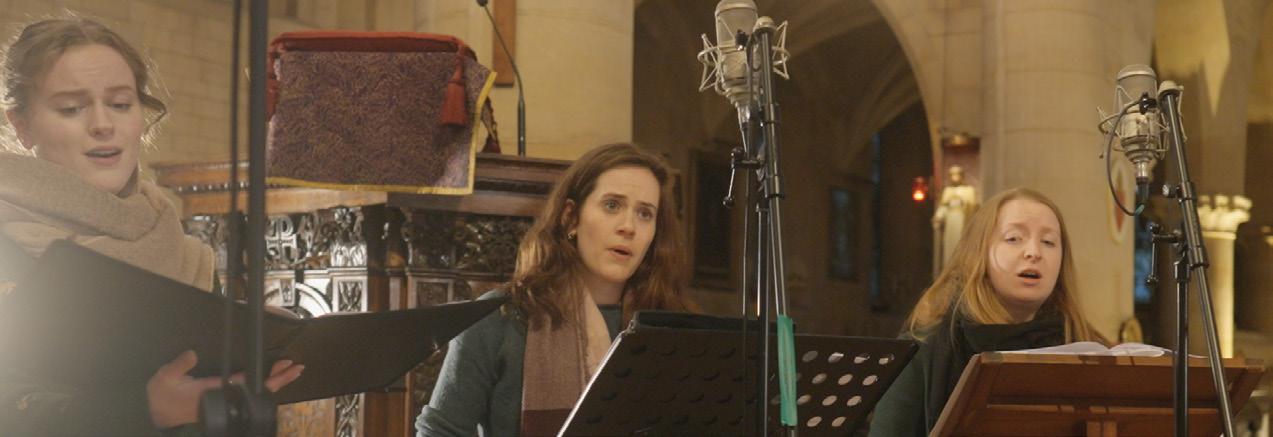
29 A spotless rose A spotless rose is blowing Sprung from a tender root, Of ancient seers’ foreshowing, Of Jesse promised fruit; Its fairest bud unfolds to light Amid the cold, cold winter And in the dark midnight.
The Rose which I am singing, Whereof Isaiah said, Is from its sweet root springing In Mary, purest maid; For through our God’s great love and might The blessed babe she bare us In a cold, cold winter’s night.
German, Es ist ein Ros entsprungen (see tracks 3 & 5), tr. Catherine Winkworth (1827–1878)
30 O Oriens
O Oriens, splendor lucis aeternae et sol iustitiae: veni et illumina sedentes in tenebris et umbra mortis.
Antiphon at vespers for 21 December
O Dawn, radiance of everlasting light and sun of righteousness: come and shed light on those who sit in darkness and death’s shadow.
31 Lulla, Lullaby
Lulla, la lulla, lulla lullaby,
My sweet little Babie, what meanest thou to cry?
Bee still my blessed babe, though cause thou has to mourne:
Whose bloud most innocent to shed, the cruell king hath sworne.
And lo, alas, behold, what slaughter hee doth make:
Shedding the blod of infunts all, sweet saviour for thy sake.
A king is borne, they say, which king this king would kill:
Oh woe, and woefull heavy day, when wretched have their will.
Lulla, la lulla, lulla lullaby, My sweet …
Anon., c. 1588
32 Lully, Lulla, Lullay
Lully, lulla, thou little tiny child, By by, lully lullay.
O sisters too, How may we do For to preserve this day
This poor youngling, For whom we do sing By by, lully lullay?
Herod the king, In his raging, Charged he hath this day His men of might, In his own sight, All young children to slay.
That woe is me, Poor child for thee!
And ever morn and day, For thy parting
Neither say nor sing By by, lully lullay!
Pageant of the Shearmen and Tailors, Coventry, 16th c. (spelling modernised; cf. track 23)
33 Es ist ein Ros entsprungen see tracks 3, 5 & 9
Recorded on 28 February 2023 in All Hallows’, Gospel Oak and 4-5 March 2024 in Lyddington Parish Church, Rutland
Producer/Engineer: Paul Baxter
24-bit digital editing: Jack Davis
24-bit digital mastering: Paul Baxter
Cover photograph: Vincent Guth Design: Drew Padrutt
Booklet editor: Henry Howard
Session photography: Will Coates-Gibson/Foxbrush
Delphian Records Ltd – Edinburgh – UK www.delphianrecords.com
Founded in 2015 at Cambridge University by Humphrey Thompson and Toby Ward, Ensemble Pro Victoria is established as of Britain’s leading early music ensembles.

www.delphianrecords.com
Named after a favourite Spanish Renaissance battle mass by T.L. de Victoria, the Missa Pro Victoria, the ensemble put down roots in the rich tradition of combined historical research and performance. It won joint-first prize at the London International Festival of Early Music’s Young Ensemble Competition in 2020 and a first album, Robert Fayrfax: Music for Tudor Kings and Queens (Delphian DCD34265) was received with critical acclaim in 2021, winning five stars from Choir and Organ and being praised for ‘outstanding vocal energy and stylistic elan’ in Cathedral Music. Major highlights for the ensemble include Monteverdi Vespers in the chapel of King’s College, Cambridge, and a live Tudor Vespers on BBC Radio 3 from Hampton Court Palace. Ensemble Pro Victoria collaborates extensively with musicologist Magnus Williamson to fulfil its vision of stimulating performance combined with cutting-edge research, a collaboration which bore fruit in the recent album Henry VIII on Tour: Music from Tudor Royal Progresses (Delphian DCD34335, released in 2025). It is one of the few groups in the world to practice choir-book performance from one manuscript, while researching the effects of this lost manner of performance. The ensemble also runs workshops and joint concert days to educate, inspire and develop love for early music and music-making.
Toby Ward was born in Otley, Wharfedale, in 1993. He was one of the last choristers of Leeds Parish Church, studying organ with David Houlder and Simon Lindley before joining the choir of Gloucester Cathedral under Adrian Partington. He read music as a choral scholar at King’s College Cambridge under Sir Stephen Cleobury, followed by postgraduate studies in singing at the Royal College of Music, studying with Alison Wells, and continued studies in conducting and choir training with Paul Brough.
A versatile conductor, singer and organist, he is director of music for the Grand Priory of England and a specialist in liturgical provision. He regularly sings with vocal ensembles Tenebrae Choir and Contrapunctus, and is known for his work with boy trebles, having taught at Westminster Abbey, Durham and Newcastle Cathedrals. Future projects with Ensemble Pro Victoria expand on his research interests including the combined liturgical and musical traditions of Catholic worship and the use of instruments in Renaissance polyphony.
Rowan Williams is a theologian and poet living in Wales. From 2002 to 2012 he served as Archbishop of Canterbury, and, as Baron Williams of Oystermouth, sat as a lord temporal in the House of Lords from 2013 to 2020. He is a former master of Magdalene College, Cambridge.
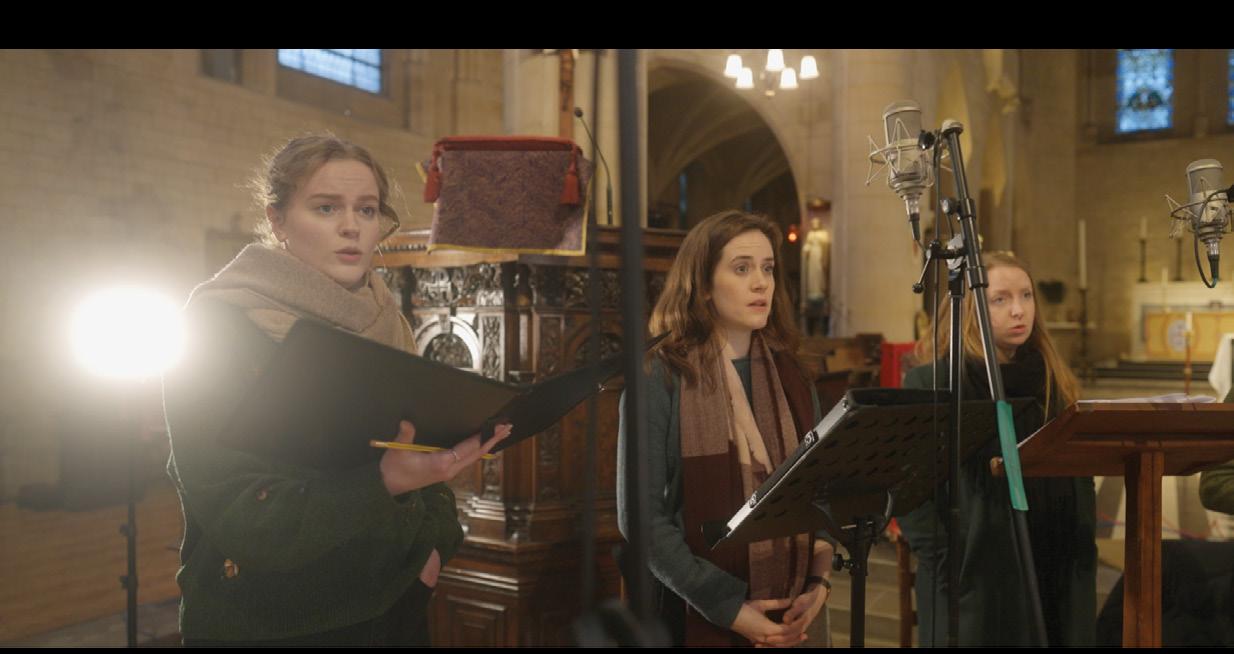
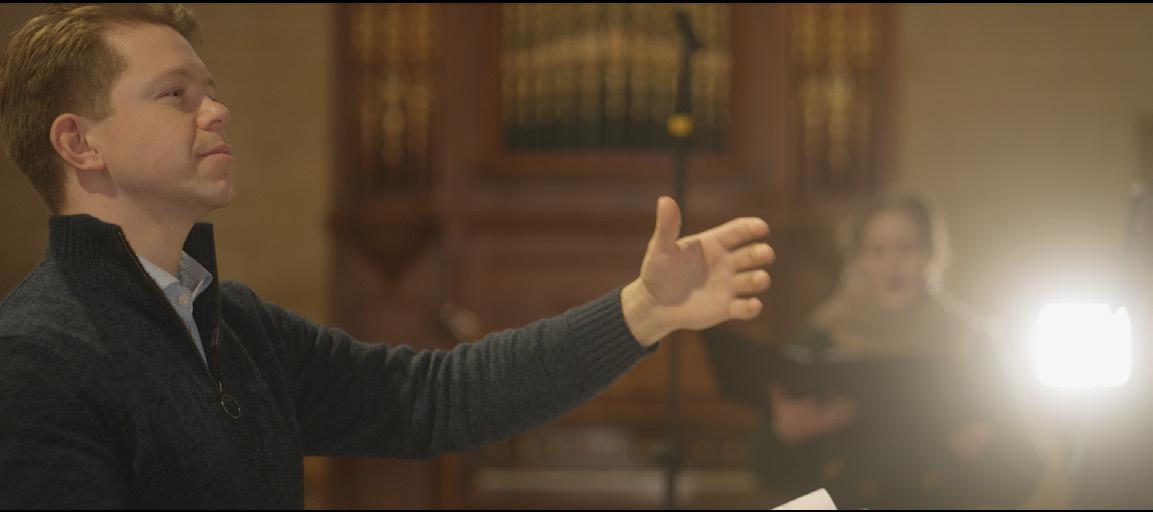
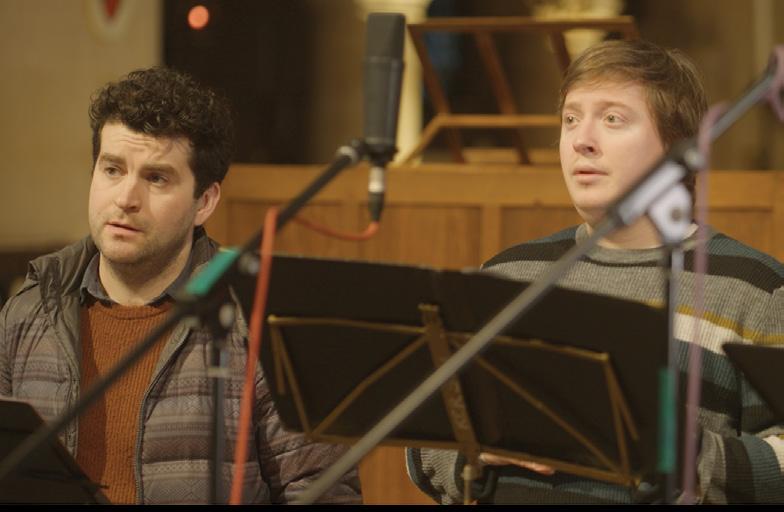
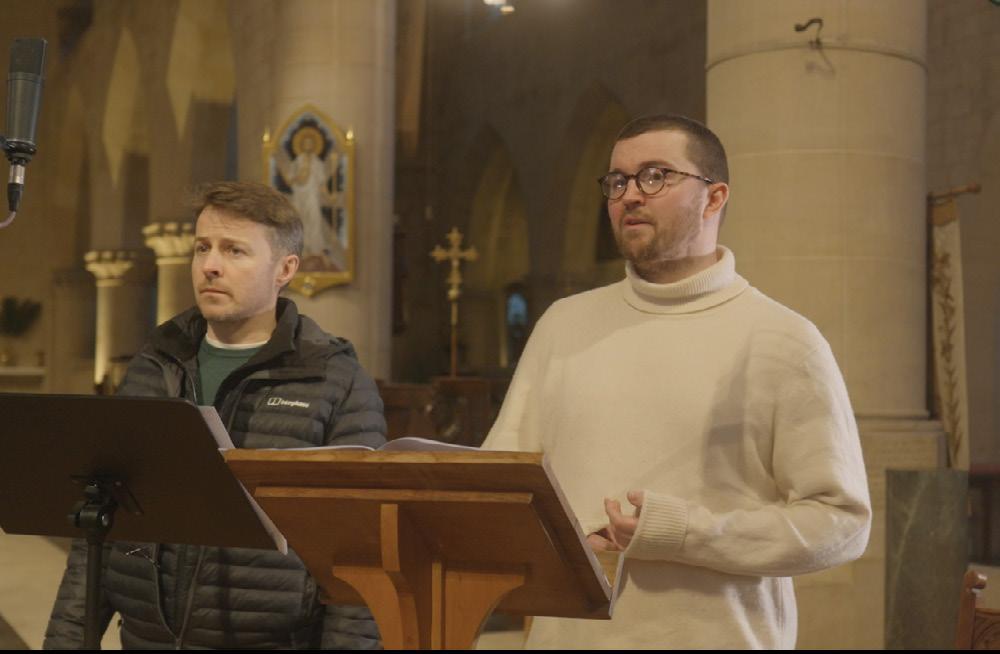
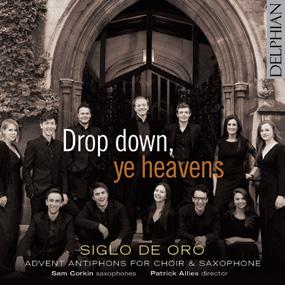
Drop down, ye heavens: Advent antiphons for choir & saxophone
Siglo de Oro / Patrick Allies; Sam Corkin saxophone
DCD34184
Siglo de Oro’s recording debut highlights the saxophone’s natural kinship with the human voice, as well as the endless expressive possibilities which this versatile instrument stimulates in the imaginations of modern composers. Its athletic vigour launches Will Todd’s O Wisdom, the first of eight newly commissioned settings of the Advent antiphons in English which form the backbone of this recording. Elsewhere the instrument soars above the voices’ urgent prophecy and imploration, while the choir is heard unaccompanied in glowing renditions of sixteenth-century polyphony – works by Pierre Certon, Antoine de Mornable, Michael Praetorius and Josquin des Prez, whose music complements the atmosphere of quiet expectancy proper to Advent.
‘Invigorating … hits you with its character and depth’ — Gramophone, December 2016
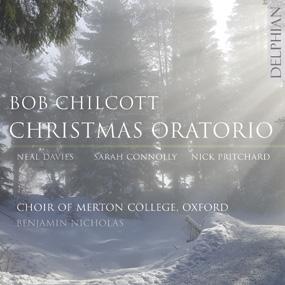

Bob Chilcott: Christmas Oratorio
Sarah Connolly, Nick Pritchard, Neal Davies; Choir of Merton College, Oxford, Oxford Contemporary Sinfonia / Benjamin Nicholas DCD34321
Hailed as ‘a palpable success … and utterly new’ at its premiere performance, Bob Chilcott’s Christmas Oratorio brings the magic, wonder and joy of a centuries-old story to modern-day life. This first recording reassembles the glittering cast of soloists from the premiere: Nick Pritchard’s Evangelist, intimately accompanied by harp and flute, is joined by mezzo-soprano Dame
Sarah Connolly and bass Neal Davies. Benjamin Nicholas’s award-winning Choir of Merton College, Oxford enrich the Christmas story with carols that are sure to become instant favourites. The composer is delighted with the recording, describing it as ‘elegant, well paced and poised … The choir is fabulous –confident and sure’.
‘moments of rapt stillness that mark that certain Christmas magic … amidst some lovely settings’ —BBC Music Magazine, November 2023
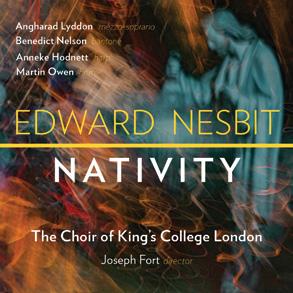
Edward Nesbit: Nativity
The Choir of King’s College London / Joseph Fort
DCD34267
The Choir of King’s College London follow up on their first recording of Edward Nesbit’s sacred choral music, named a Gramophone Editor’s Choice in 2022, with Nativity, a programme of Christmas music written by the composer over the last ten years: a joyful celebration that places Nesbit at the heart of a thriving British choral scene. At the heart – but slightly to one side too. In a crowded field, Nesbit’s voice is distinctive. Expect much more fast-paced music than is the norm, an abundance of musical references to the classical canon, and frequent touches of humour. With their young, zestful performances, Nesbit’s music benefits from his close collaboration with the choir and its director Joseph Fort.
‘Nativity is a most attractive and imaginative score and I like the originality of Nesbit’s concept. All the performers give of their best and it’s hard to imagine that the work could have received a finer first recording’
— MusicWeb International, November 2024
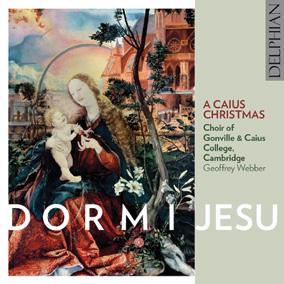
Dormi Jesu: A Caius Christmas
Choir of Gonville & Caius College, Cambridge / Geoffrey Webber DCD34152
It was with typical discernment that Geoffrey Webber responded to a request to put together his dream Christmas programme. Opening with Jan Sandström’s sublime deconstruction of Es ist ein Ros entsprungen, Webber’s classy choir reveals and delights in equal measure, finding space for both the Venetian lushness of Gabrieli and the distilled purity of Webern in a seasonal collection which is also sprinkled with unexpected gems of more recent provenance.
Edward Higginbottom’s jazz-infused Rocking Carol, Thomas Hewitt Jones’s eloquently expressive What Child is This?, and the small miracle that is Matthew Owens’ reimagined setting of The Holly and the Ivy – all glitter in a programme that dovetails old and new with characteristic Cambridge sophistication.
‘Geoffrey Webber’s “dream Christmas programme” enjoys superb sound, and singing burgeoning with colour and confidence’
— BBC Music Magazine, Christmas 2014
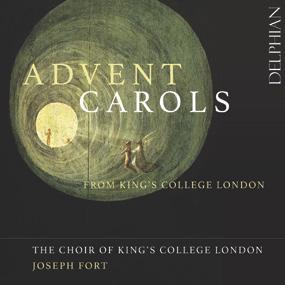
Advent Carols from King’s College London
The Choir of King’s College London / Joseph Fort DCD34226
Every December, over a thousand people attend the Advent carol service in the Chapel of King’s College London, which is repeated over three nights to meet demand. This album offers a snapshot of one such service, with its characteristic mix of plainchant, seasonal hymns and polyphony old and new.
The Great O Antiphons (sung according to medieval Sarum practice) provide the backbone, pointing inexorably towards the Christmas birth. A brace of premiere recordings centres on composers with personal connections to King’s College, and is complemented by current Professor of Composition
George Benjamin’s rarely heard setting of a prophetic text after Isaiah. It intensifies the mood of heightened expectation proper to this very special season, and reminds us that something truly extraordinary is about to happen.
‘if, like me, you get a little tired of the “souped up” Christmas musical fare that often gets served up in new releases at this time of year, this disc will prove a perfect antidote’ — MusicWeb International, November 2019
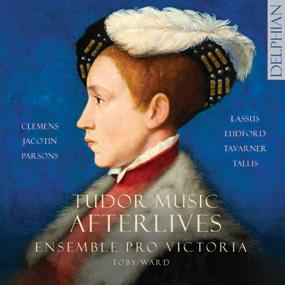
Tudor Music Afterlives
Ensemble Pro Victoria, Toby Carr lute, Magnus Williamson organ / Toby Ward DCD34295
Following the freshness and vigour of their quincentenary portrait celebration of Robert Fayrfax, Ensemble Pro Victoria’s second Delphian album brings a similar boldness of approach to a wider-ranging collection, charting some rarely explored territory from a time of great religious, societal and musical change. Broken fragments of huge pre-Reformation works, preserved only in lute tablature; the first reconstruction and recording of some of the earliest Anglican psalm settings ever written; French chansons and motets once popular in England; improvisatory organ verses within Lady Mass movements by Ludford; and an English-texted version of a much-loved Tallis anthem that shows it in a quite different light: these forgotten ‘afterlives’ of earlier Tudor music help build a much more complete picture of music in sixteenth-century England.
‘This combination of cutting-edge scholarship and outstanding performance gives us a recording of the highest quality, apt for edification and pleasure’
— Early Music Review, November 2022
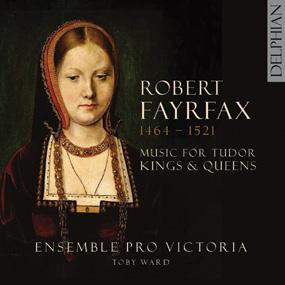

Robert Fayrfax (1464–1521): Music for Tudor Kings & Queens
Ensemble Pro Victoria / Toby Ward
DCD34265
In that golden age of British choral music half a millennium ago, when polyphonic voices soared in the vaulting of the great late-Gothic churches and chapels that seemed to have been built for them to fill, one composer was in especial favour with the royal family: Robert Fayrfax. A newly reconstructed movement from a mass for the private wedding of Henry VIII and Catherine of Aragon, later treasured in darker times by the recusant gentry for its Catholic associations, sits here alongside exuberant masterpieces from the Eton Choirbook and, in intimate contrast, Fayrfax’s seven surviving courtly songs, brought together on a single recording for the first time. An exciting new signing for Delphian, Ensemble Pro Victoria’s young professionals bring both freshness and individuality to Fayrfax’s music in the five hundredth anniversary year of his death.
‘one of Britain’s finest young vocal ensembles … supported by musical scholarship of the highest order’ — Early Music Review, October 2021
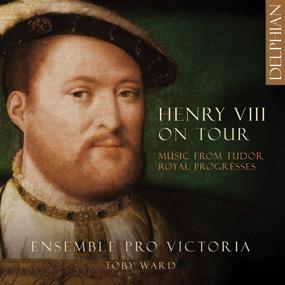
Henry VIII on Tour: Music from Tudor Royal Progresses
Ensemble Pro Victoria / Toby Ward
DCD34335
Under Henry VIII, royal progresses were both journeys and sonic experiences. Solemn polyphony accompanied the king’s devotions; jubilant songs rang out in great halls; charming miniatures were shared in the intimacy of the privy chamber. Made in collaboration with the Henry on Tour research project that brought together Historic Royal Palaces and the universities of Newcastle and York, Gramophone Award-nominated Ensemble Pro Victoria, under the direction of Toby Ward and guided by Professor Magnus Williamson, vividly capture these Tudor soundscapes in a programme of glorious but often little-known music, including a number of premiere recordings.
‘everything is more intimate, more personal, simply one or two musicians entertaining the king or the dozen or so singing men and boys of the Riding Chapel providing music at mass. As might be expected from Toby Ward and Ensemble Pro Victoria, performances are stylish and engaging’
— Robert Hugill, June 2025
